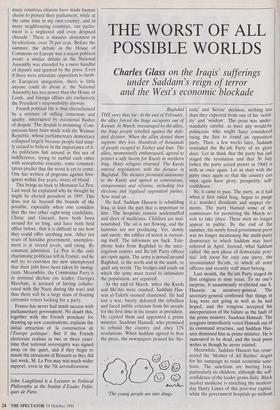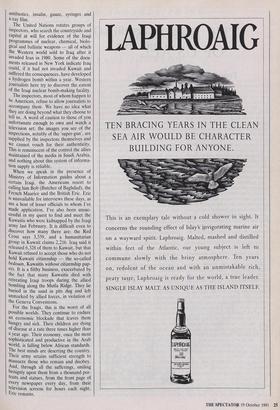THE WORST OF ALL POSSIBLE WORLDS
Charles Glass on the Iraqis' sufferings under Saddam's reign of terror and the West's economic blockade
Baghdad THE story thus far: At the end of February, the allies forced the Iraqi occupiers out of Kuwait. In March, encouraged by the allies, the Iraqi people rebelled against the defe- ated dictator. When the allies denied them support, they lost. Hundreds of thousands of people escaped to Turkey and Iran. The allies, momentarily embarrassed, agreed to protect a safe haven for Kurds in northern Iraq. Many refugees returned. The Kurds entered negotiations with the dictator in Baghdad. The dictator promised autonomy to the Kurds and agreed to concessions, compromises and reforms, including free elections and legalised opposition' parties. Now read on. . .
He lied. Saddam Hussein is rebuilding Iraq, at least the part that is important to him. The hospitals remain understaffed and short of medicines. Children are mal- nourished. The oil is not flowing, and the factories are not producing. Yet, slowly and surely, the edifice of terror is recreat- ing itself. The informers are back. Tele- phone links from Baghdad to the inter- rogation centres and Ba'ath Party offices are open again. The army is poised around Baghdad, in the north and in the south, to quell any revolt. The bridges and roads on which the army must travel to intimidate the population, are repaired.
At the end of March, when the Kurds and Shi'ites were crushed, Saddam Hus- sein al-Takriti seemed chastened. He had lost a war, barely defeated the rebellion and faced public criticism from his people for the first time in his tenure as president. He cajoled them and appointed a prime minister, Saadoun Hamadi, who promised to rebuild the country and obey UN resolutions. When Saddam agreed to free the press, the newspapers praised his 'his- 'The young people are into drugs.' tonic' and 'heroic' decision, nothing less than they expected from one of his 'nobil- ity' and 'wisdom'. The press was under- standably careful, as were any would-be politicians who might have considered being the first to found an opposition party. Then, a few weeks later, Saddam reminded the Ba'ath Party of its glory days: 'Let us think that the party has just staged the revolution and that 30 July [when the party seized power in 1968] is with us once again. Let us start with the party once again so that the country can once again have glory, prosperity, self- confidence.'
So, it came to pass. The party, as it had when it first ruled Iraq, began to purge (i.e. murder) dissidents and suspect ele- ments. The party blamed some of its commissars for permitting the March re- volt to take place. These men no longer appear in public. By the end of the summer, the newly freed government press was no longer mentioning the multi-party democracy to which Saddam may have referred in April. Instead, what Saddam called 'the new phase of democratic prac- tice' left room for only one party, the reconstituted Ba'ath, to which all army officers and security staff must belong.
Last month, the Ba'ath Party staged its first congress in nine years. To no one's surprise, it unanimously re-elected one S. Hussein as secretary-general. The secretary-general confessed that things in Iraq were not going as well as he had hoped, and the congress accepted his interpretation of the failure as the fault of the prime minister, Saadoun Hamadi. The congress immediately voted Hamadi out of its command structure, and Saddam Hus- sein dismissed him as prime minister. He is rumoured to be dead, and the local press writes as though he never existed.
Meanwhile, Saddam Hussein has resur- rected the 'Mother of All Battles' slogan for his campaign to resist economic sanc- tions. The sanctions are hurting Iraq, particularly its children, although the self- confidence of the leader grows daily. Black market medicine is enriching the modern- day Harry Limes of this post-war capital, while the government hospitals go without antibiotics, insulin, gauze, syringes and x-ray film.
The United Nations rotates groups of inspectors, who search the countryside and capital at will for evidence of the Iraqi programmes of nuclear, chemical, biolo- gical and ballistic weapons — all of which the Western world sold to Iraq after it invaded Iran in 1980. Some of the docu- ments released in New York indicate Iraq could, if it had not invaded Kuwait and suffered the consequences, have developed a hydrogen bomb within a year. Western Journalists here try to discover the extent of the Iraqi nuclear bomb-making facility.
The inspectors, most of whom happen to be American, refuse to allow journalists to accompany them. We have no idea what they are doing beyond what they choose to tell us. A word of caution to those of you unfortunate enough to own and watch a television set: the images you see of the inspections, notably of the 'super-gun', arc supplied by the inspectors themselves and we cannot vouch for their authenticity. This is reminiscent of the control the allies maintained of the media in Saudi Arabia, and nothing about this system of informa- tion supply is reliable.
When we speak in the presence of Ministry of Information guides about a certain Iraqi, the Americans resort to calling him Bob (Butcher of Baghdad), the French Maurice and the British Eric. Eric IS unavailable for interviews these days, as are a host of lesser officials to whom I've made application. I've also been unsuc- cessful in my quest to find and meet the Kuwaitis who were kidnapped by the Iraqi army last February. It is difficult even to discover how many there are: the Red Cross says 3,559, and a humanitarian group in Kuwait claims 2,216. Iraq said it released 6,328 of them to Kuwait, but that Kuwait refused to accept those who do not hold Kuwaiti citizenship — the so-called bedouin, Kuwaitis without citizenship pap- ers. It is a filthy business, exacerbated by the fact that many Kuwaitis died with retreating Iraqi troops during the allied bombing along the Mutla Ridge. They lie buried in the sand in pits dug and left unmarked by allied forces, in violation of the Geneva Conventions.
For the Iraqis, this is the worst of all Possible worlds. They continue to endure an economic blockade that leaves them hungry and sick. Their children are dying of disease at a rate three times higher than a year ago. Their economy, once the most sophisticated and productive in the Arab world, is falling below African standards. The best minds are deserting the country. Their army retains sufficient strength to massacre those who remain and disobey. And, through all the sufferings, smiling
benignl-
y upon them from a thousand por- traits and statues, from the front page of every newspaper every day, from their television screens for hours each night, Eric remains.



























































 Previous page
Previous page